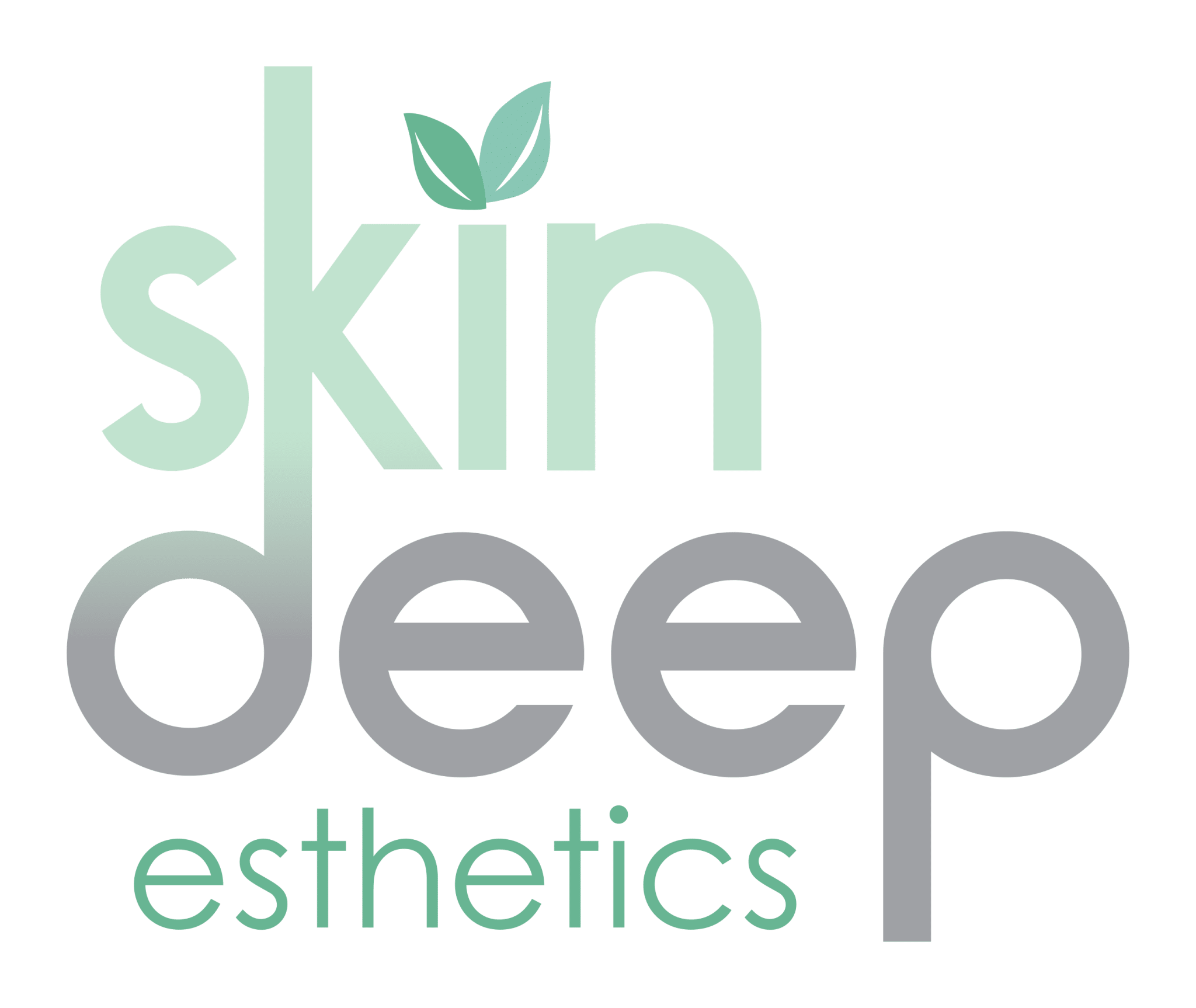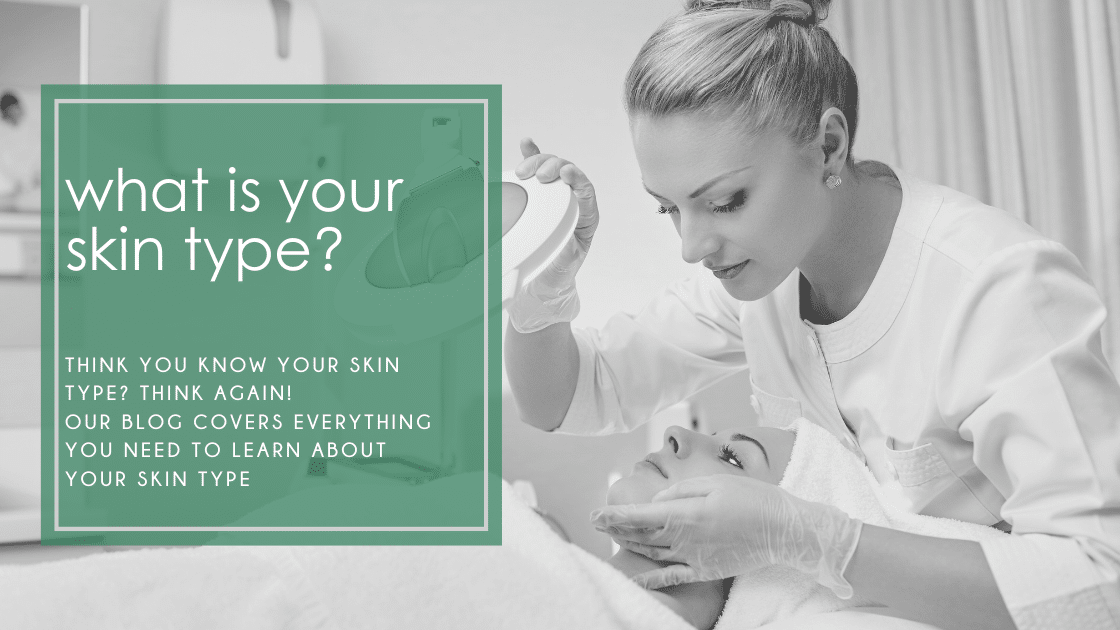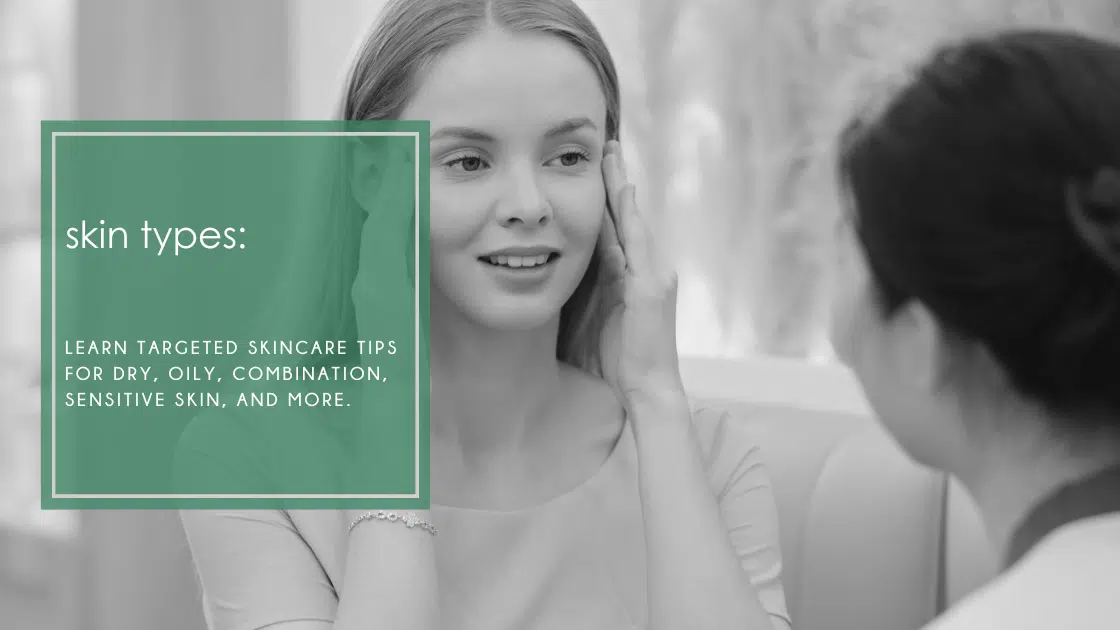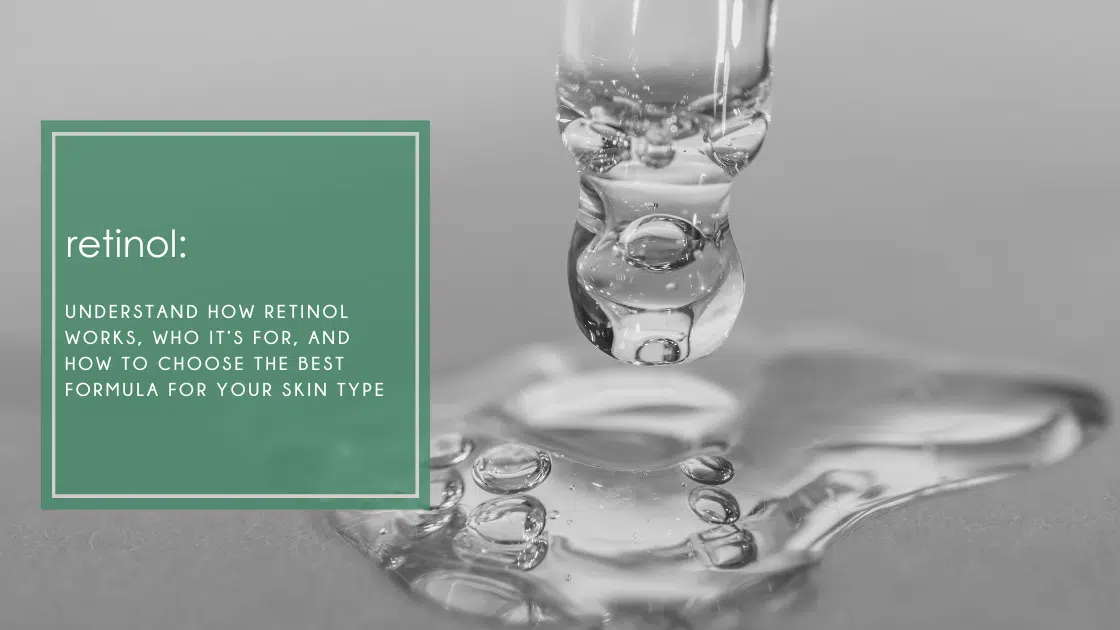Do You Know Your Skin Type?
Do you know your skin type? Think again! Most of you reading this don’t know your skin type! And you end up using the wrong products. Let’s change that today!!
Skin type is a commonly asked question and an important topic to cover. Understanding your skin type is crucial for maintaining healthy skin. How you treat your skin or the products used can worsen your skin. Not knowing your skin type means not only using the wrong skincare products, but you can damage your skin’s barrier and never find the solution. That’s where we, as estheticians, come in. We help you identify your skin type, hand-pick skincare products tailored to your skin’s specific needs, and prevent future skin conditions.
Today we are breaking down each skin type, helping you understand yours, and sharing the best skincare products for your skin.
What Are The Different Skin Types?
Traditionally there were four main skin types: normal, dry, oily, and combination. However, due to lifestyle changes, we now notice various newer skin types, such as dehydrated, acne-prone, and sensitive. The other interesting thing about how skin types have changed over the years is how we treat the skin.
It is no longer about using a skincare line for “dry skin” or “oily skin”. Your skin’s needs are more complex and we are here to help you navigate. While most skincare companies still make specific skincare lines, these products and “lines” no longer work for most skin types. Because everyone is suddenly a skin expert, there are a multitude of skin conditions, new skin types, and ways to treat the skin.
For example, if you have dry skin, you would naturally select skincare products from the dry skin line. The problem is most skincare lines are created for one specific skin type. This is where having an esthetician is important because not all skincare lines are created equally, especially with over-the-counter products. Professional and medical-grade skincare products are designed to mix and match, plus estheticians understand how your skin works, the various skin types, and what products you will need for your skin to stay healthy.
If you google skin type, you will surely be confused as there is tons of information regarding finding your skin type. We recommend seeking an esthetician to do a full skin analysis and help you determine your skin type. This is a simple chart from the American Academy of Dermatology regarding the different skin types.
Skin Types and Conditions
Skin Types and Skin Conditions are two completely different topics. Skin Conditions such as acne, rosacea, melasma, etc. are not specific to one skin type. Each skin type can suffer from skin conditions and product selection becomes tricky for consumers. We will use acne as an example because it’s the most common concern we treat.
You have dry skin and suddenly start breaking out. Your acne is worsening, so you purchase some skincare products to help. Your skin feels exceptionally dry and is now starting to flake. So off you go to purchase a heavier moisturizer. It helps a bit, but your skin is still feeling dry and tight with some flaking; nothing you try seems to help. After some time, you notice two things happening: 1) these white bumps form under the skin and you can’t get rid of them; 2) every time you wash your face or apply your acne serum, your skin burns and gets red and irritated.
What happened?
First off, dry skin types should NEVER use acne products, these products are designed for oily skin types. This causes your skin to become even drier because it’s stripping away the oil and pulling water from the skin (last week we talked about this, check out that blog post). Those bumps under the skin? That is caused by trapped oil – when you strip the oil and water from the skin, oil can’t get out of the pores because there’s no water to float it out. These can be easily extracted, but switching skincare products will prevent this!
The red, dry, and irritated skin? Also caused by using products that aren’t designed for your skin type. The stripping action from the acne products causes your skin to become sensitized, dry, and irritated. This is why your skin burns when you apply your products. This common scenario is why clients see us when their skin responds like this. The good news is, that estheticians can balance out your skin and help to rehydrate it. However, it can take about 4-6 weeks for your skin to adjust, but as long as you are patient and continue to follow our guidance, your skin will improve and feel healthy and hydrated again!
Let’s answer your FAQs before we break down the different skin types
Are Skin Types Genetic?
Yes, your skin type was predetermined before you were born.
Can Skin Types Change?
Yes, due to hormones, aging, and environmental factors. For example, during puberty, your skin produces more oil, causing acne. Teenager’s oil glands are learning to adjust and can overproduce or underproduce, resulting in large pores, blackheads, and acne. Pregnancy can bring changes to your skin type, however, this is temporary and once pregnancy hormones resume to normal, the skin does too. Menopause is when women see the majority of their skin changes happening. Menopause can shift oily skin to dry skin due to decreased estrogen.
What Are The Different Skin Types?
The skin types we need now include dry skin, normal skin, combination skin, oily skin, acne-prone skin, dehydrated skin, and sensitive skin. We are going to break each of those skin types down. We will explain each skin type, how to identify it, and products and treatments for your skin type.
Dry Skin
🌵 Dry skin produces less oil than other skin types and is characterized by tiny pores. Dry skin lacks, what we call, a lipid barrier, making it difficult to retain water. Dry skin can be caused by certain medications, aging, sun exposure, and hormonal shifts (especially in women)
Skincare Products For Dry Skin
Cleansers: Cream-based or Oil-based cleansers
Exfoliants: Enzyme or Gommage only (limit acids )
Serums: Hyaluronic Acid, Salmon DNA, Bakuchiol, Peptides, Vitamin C
Moisturizers: Heavier barrier-protecting moisturizers
SPF: Always wear sunscreen!
Click here to shop skincare
Normal Skin
🌟 Normal skin is balanced skin with minimal concerns. Characterized by a smooth, healthy appearance and minimal pore size. Normal skin looks healthy, glowing, and smooth
Skincare Products For Normal Skin
Cleansers: Foaming, Cream-based or Oil-based (depending on the season)
Exfoliants: Enzyme or Gommage, and mild acids
Serums: Hyaluronic Acid, Vitamin C, Peptides, Retinol or Bakuchiol
Moisturizers: Light lotions or cream moisturizers (depending on the season)
SPF: Always wear sunscreen!
Click here to shop skincare
Combination Skin
💧 Combination skin is the most common and tricky to manage because it tends to be both oily and dry. The typical combination skin types have an oily T-zone area (forehead, nose, chin) while the rest of the face is dry. Characteristics include large pores in the T-zone, acne, blackheads, and dry or flaky skin on the cheeks and sides of the face.
Skincare Products For Combination Skin
Cleansers: Foaming or Cream-based (depending on the season)
Exfoliants: Enzymes or Gommage, and mild acids
Serums: Vitamin C, Retinol or Bakuchiol, Hyaluronic acid, Peptides
Moisturizers: Light lotions or cream moisturizers (depending on the season)
SPF: Always wear sunscreen!
Click here to shop skincare
Oily Skin
💦 Oily skin tends to produce extra oil. This skin type is acne-prone due to the amount of oil produced in the skin. Characteristics include large pores, shiny skin, excessive oil production, acne, blackheads, or whiteheads. This skin type tends to use stripping products and can dehydrate or create skin sensitivity. The key is to find skincare products that balance the skin without stripping.
Skincare Products For Oily Skin
Cleansers: Foaming or Gel cleansers (Cream-based cleansers in dry climates or winter months)
Exfoliants: Gommage or Enzyme, and light acids
Serums: Vitamin C, Retinol, Salicylic acid, and Hyaluronic acid (in winter)
Moisturizers: Lightweight lotions
SPF: Avoid chemical-based sunscreens to prevent skin irritation
Click here to shop skincare
Acne-Prone Skin
🔥 Any skin type can be acne-prone. Characterized by blackheads, whiteheads, and acne; our training taught us that acne is caused by bacteria in the pores. When the pores get clogged and form blackheads, the bacteria build up creating acne. This is what most acne products are designed to treat. However, with acne, there are various causes and our goal is to find the root cause so you can clear your acne for good.
Skincare Products For Acne-Prone Skin
Cleansers: Foaming or Gel-based
Exfoliants: Enzymes or mild acids
Serums: Salicylic acid, Mandelic acid, Hyaluronic acid, Vitamin C, and Retinol (if needed to help with the scarring)
Moisturizers: Light lotions or cream moisturizers (depending on the skin type)
SPF: Avoid chemical-based sunscreens to prevent skin irritatio
Click here to shop skincare
Dehydrated Skin
💧 Dehydrated skin is a newer skin condition that lacks water and oil. This can be caused by skincare products that are too strong for your skin. Characteristics include dryness, flakiness, rough skin, excess oil meaning you feel both dry and oily at the same time, large pores, blackheads, and acne. Dehydrated skin happens when water is stripped from the skin. This results in the oil glands producing extra oil to compensate for the lack of water in the skin. This skin type also tends to feel rough and textured. You also tend to get white bumps that form under this skin. This is trapped oil that can’t get out because there is not enough water in the skin to float the oil out of the pores.
Skincare Products For Dehydrated Skin
Cleansers: Cream-based or Oil-based (foaming only in the summer months, if necessary)
Exfoliants: Enzymes or Gommage (limit mild acids)
Serums: Hyaluronic acid, Bakuchiol, Vitamin C, and Peptides
Moisturizers: Cream-based moisturizers or lotions
SPF: Always wear sunscreen!
Click here to shop skincare
Sensitive Skin
🌸 Sensitive skin is a bit more complex because some people naturally have sensitive skin. Characterized by rosacea, eczema, psoriasis, or dermatitis, however, some skin types are reactive to certain skincare ingredients. Sensitive skin can be created by using the wrong products or aggressive skin treatments. At first, your skin becomes dehydrated, but if dehydrated skin is left untreated, the skin becomes sensitized and may react to any skincare product you use. Certain products can break down the skin’s barrier and when the skin becomes compromised, the result is sensitized and irritated skin.
Skincare Products For Sensitive Skin
Cleansers: Cream-based or Oil-based
Exfoliants: Gommage or Enzyme 1x a week ONLY
Serums: Hyaluronic Acid, Salmon DNA, Peptides, and Bakuchiol
Moisturizers: Hydrating moisturizers
SPF: Always wear sunscreen!
Click here to shop skincare
We hope you enjoyed learning about the various skin types. Hopefully, this helps you understand your skin better so you can make better skincare purchases and find an esthetician to help you.
Ready To Discover Your Skin Type?
Still uncertain about your skin type? Book a consultation with us and let’s get you on the right path to healthy skin. Our goal is to help you avoid any common skincare mistakes. Check out our website to learn more and book your first appointment.
If you have any questions, please drop them in the comment section below




